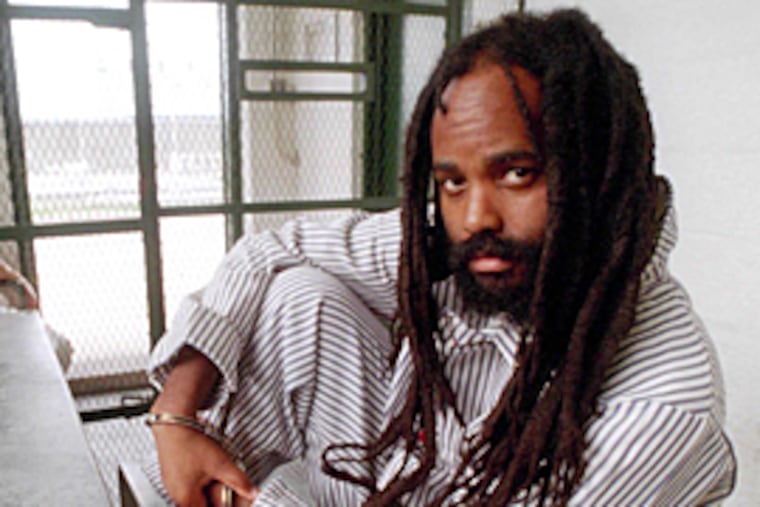No death for Mumia Abu-Jamal - at least for now
A federal appeals court today refused to reinstate the death sentence of world-famous death row inmate Mumia Abu-Jamal, but left intact his murder conviction in the 1981 shooting death of Philadelphia Police Officer Daniel Faulkner.

A federal appeals court today refused to reinstate the death sentence of world-famous death row inmate Mumia Abu-Jamal, but left intact his murder conviction in the 1981 shooting death of Philadelphia Police Officer Daniel Faulkner.
A three-judge panel of the U.S. Court of Appeals for the Third Circuit ruled that Abu-Jamal must be sentenced to life in prison or get a chance with a new Philadelphia jury, which would decide only whether he should get life in prison or be sentenced - again - to death.
The judges left intact his first-degree murder conviction, rejecting Abu-Jamal's claim that he deserves an entirely new trial and a chance to prove his innocence.
Abu-Jamal, who has written books and given taped speeches from death row, was convicted in 1982 by a Philadelphia jury of killing Faulkner, who was shot to death near 13th and Locust Streets in the early morning hours of Dec. 9, 1981.
The Third Circuit upheld, in all respects, the 2001 decision by U.S. District Judge William H. Yohn Jr., who rejected all but one of Abu-Jamal's legal claims, but threw out the jury's death sentence.
Yohn ruled that the jury in Abu-Jamal's 1982 trial may have mistakenly believed it had to agree unanimously on any "mitigating" circumstances -- factors that might have persuaded jurors to decide on a life sentence instead of death.
The appeals court affirmed that decision, and said that the state has six months to hold a new sentencing hearing for Abu-Jamal, or he must be sentenced to life in prison.
"The jury instructions and the verdict form created a reasonable likelihood that the jury believed it was precluded from finding a mitigating circumstance that had not been unanimously agreed upon," wrote Chief Judge Anthony J. Scirica in the 77-page opinion.
Judge Thomas L. Ambro wrote that he would have gone further than his two colleagues, and granted a hearing on Abu-Jamal's contention that the prosecution unfairly excluded blacks from his jury in violation of a 1986 U.S. Supreme Court case, Batson v. Kentucky.
"To move past the prima facie case is not to throw open the jailhouse doors and overturn Abu-Jamal's conviction," wrote Ambro. "It is merely to take the next step in deciding whether race was impermissibly considered during jury selection."
Abu-Jamal's lawyer, Robert R. Bryan of San Francisco, said yesterday that he was pleased that the death sentence was not reinstated, as prosecutors had wanted. But he expressed disappointment that only Ambro had wanted to grant relief on the claim that blacks were intentionally excluded from the jury.
"I am not happy that two of the three judges turned a deaf ear to the racism that permeated this case," said Bryan, who said he was "heartened and thrilled" by Ambro's dissent on that issue.
There was no immediate response from the Philadelphia District Attorney's Office. A spokeswoman said she expected District Attorney Lynne Abraham to hold a news conference later today.
Other Abu-Jamal supporters were unhappy with the ruling. They said rallies were being planned for as early as tomorrow outside federal courthouses in Philadelphia, New York and San Francisco.
"This was no victory, in any sense of the word," said Pam Africa, a member of the radical group MOVE.
"Today's decision is a travesty of justice," said Jeff Mackler, of Mobilization to Free Mumia Abu-Jamal. He said he had been hoping that the Third Circuit would order an entirely new trial based on the claim about racial discrimination in jury selection.
Mackler said he anticipates worldwide reaction to the disappointing decision. "Tomorrow is just an initial reaction," he said.
An appeal is virtually certain.
Either side could ask the panel to reconsider the decision, ask the entire Third Circuit to consider the case, or eventually ask the U.S. Supreme Court to intervene.